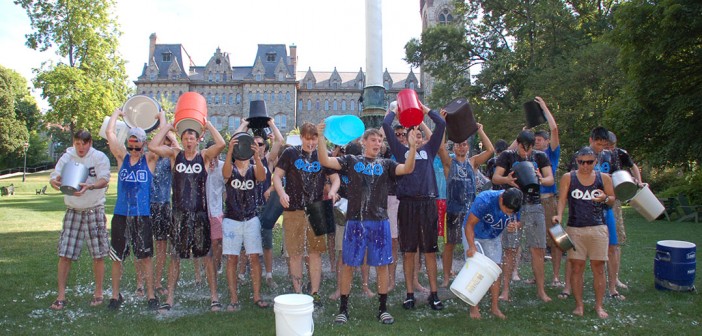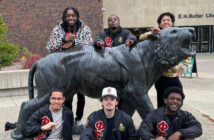About 30 Phi Delta Theta fraternity brothers stood in a group, nervously eying one another, on the UC Front Lawn on Wednesday.
As they turned their gazes toward the many cameras capturing the moment, a few chuckles managed to escape their lips. In front of each them were buckets of all different shapes and sizes, filled to the brim with ice-cold water. In the blink of an eye, each of the boys reached down, grabbed their buckets and simultaneously poured them on their own heads. The end result was a group of soaking wet, freezing cold college boys with smiles on their faces.
This sight might have seemed strange a year ago. People might have passed by and thought, “boys will be boys.” However, thanks to a widely popular social media campaign that swept the nation last summer, this sight wasn’t strange at all. Anyone with a Facebook account — or a computer, for that matter — would probably know that they just witnessed the ALS Ice Bucket Challenge.
The challenge itself is quite simple: Pour a bucket of ice-cold water onto your head or donate $100 to the ALS Foundation, which goes toward fighting amyotrophic lateral sclerosis (ALS).
The disease is defined by the ALS Association as “a progressive neurodegenerative disease that affects nerve cells in the brain and the spinal cord.” The association also explains how the disease attacks and kills motor neurons in the body. As a result, those who are diagnosed progressively lose control of their muscles and may even become completely paralyzed. There is currently no cure for ALS.
Social media has played a large role in spreading awareness about the disease via the Ice Bucket Challenge. Participants are urged to post videos of themselves completing the challenge and then nominate their friends.
“This summer, there were very generous donations from the people participating (in the Ice Bucket Challenge) that circulated everywhere in social media and the internet,” said Luke Beil, ’15, a member of the Phi Delta Theta fraternity. “So we wanted to do (the challenge), too.”
The challenge has been accepted by everyone ranging from celebrities, like Jennifer Aniston, to political figures, such as former President George W. Bush. According the ALS Association, as of Sept. 2, the Ice Bucket Challenge has raised a staggering $106 million.
Along with partaking in the Ice Bucket Challenge, Phi Delta Theta also hosted a Strike Out ALS event earlier that day to raise money and spread awareness about the disease.
The theme for the event was baseball in order to pay homage to Lou Gehrig, a famous baseball player for the New York Yankees, who died of the disease in 1947. Gehrig has since become the face of the disease, which is commonly referred to as “Lou Gehrig’s disease.” He was also a member of Phi Delta Theta.
“Since we’re in Phi Delta Theta and Lou Gehrig was a former Phi Delta Theta, our main philanthropy event is to raise money for the ALS Association,” said Will Hoelke, ’16, a member of the fraternity and part of the philanthropy committee that spearheaded this event. “We always have something baseball-themed every year; we do it in his honor.”
Aside from honoring a former member, Phi Delta Theta also created this event to support the ALS Association, which is their national philanthrop. Beil was one of the main people responsible for organizing the event, which the fraternity hosted last year as well.
“Over the summer, I contacted a place called Metz Amusements in Wind Gap, Pennsylvania,” Beil said. “They had a speed pitch machine with some baseballs and a radar gun.”
This equipment was used as the main attraction at the event from 12 to 4 p.m. Students and faculty were encouraged to buy pitches (1 for $1, 3 for $2, and 5 for $3) and compete against friends to attain the fastest speed.
Willy O’Sullivan, ’16, and Michael Lefkoe, ’15, were just two of the members of Phi Delta Theta to get involved by manning the table at the event. While trying to persuade students who passed by to participate and donate, the two expressed their happiness about the increase in awareness of ALS.
“We were very happy to see that ALS has been so popular in the news,” Lefkoe said.
“There (are) a bunch of different ways to donate. This is just one of the ways,” O’Sullivan said. “But there’s a whole bunch of foundations in the area where you can donate nationally.”
To continue the increased awareness that the Ice Bucket Challenge has created, Phi Delta Theta then participated in the challenge as a chapter on the UC Front Lawn.
“I’m ecstatic,” said JJ O’Brien, ’16, president of Phi Delta Theta. “I think (the event) went over really well. I was happy to see all the brothers out here banding together in support of making sure everyone is very aware of ALS.”
Though the Ice Bucket Challenge has been widely successful and popular, some have challenged the validity of it as a fundraising mechanism. Critics have claimed that the challenge is silly and that people should donate to ALS without having to be nominated by a friend.
However, several members of Phi Delta Theta had a different opinion.
“I’m not one of the people who had anything against (the Ice Bucket Challenge),” O’Brien said. “I think that it’s a great way of actually using social media and the force behind it to perpetuate good ideas.”
Hoelke echoed O’Brien.
“I get the point of view that dumping ice water on your head isn’t raising money,” he said. “But at the same time, even if you don’t know about (ALS), you see the videos, you look, you research it. Some people find it’s a good cause, and they donate money.”
The members of Phi Delta Theta have chosen to continue spreading awareness for ALS around campus by nominating members of the Lehigh community to accept the challenge. They have nominated Director and Assistant Director of Fraternity and Sorority Affairs Tim Wilkinson and Ashley Baudouin, in addition to Zeta Tau Alpha and Alpha Gamma Delta.
“I would just love to see everyone else participate, and if you don’t want to participate, at least donate to ALS and help fight the cause,” O’Brienn said. “If that’s not your cause, then just fight and stand up for what you believe in. That’s really the ultimate outcome.”






Comment policy
Comments posted to The Brown and White website are reviewed by a moderator before being approved. Incendiary speech or harassing language, including comments targeted at individuals, may be deemed unacceptable and not published. Spam and other soliciting will also be declined.
The Brown and White also reserves the right to not publish entirely anonymous comments.
5 Comments
My first symptoms of ALS occurred in 2011, but was diagnosed in 2013. I had severe symptoms ranging from shortness of breath, balance problems, couldn’t walk without a walker or a power chair, i had difficulty swallowing and fatigue. I was given medications which helped but only for a short burst of time, then i decided to try alternative measures and began on ALS Formula treatment from Akanni herbal centre , It has made a tremendous difference for me (Visit www. akanniherbalcentre .com). I had improved walking balance, increased appetite, muscle strength, improved eyesight and others.
I stopped the ALS medications due to severe side effects. My care provider Dr Miller introduced me to Kykuyu Health Clinic and their amazing ALS/MND treatment. The herbal treatment is a miracle. my slurred speech. And then the inability to eat without getting choked, breathing, and coughing. gradually disappeared. DON’T GIVE UP HOPE!!! Reach KHC at www. kykuyuhealthclinic .com The ALS natural formula immensely helped my condition, it reversed my ALS.
I was diagnosed with bulbar ALS in the summer of 2019; My initial symptoms were quite noticeable. I first experienced weakness in my right arm and my speech and swallowing abilities were profoundly affected. The Rilutek (riluzole) did very little to help me. The medical team at the ALS clinic did even less. My decline was rapid and devastating.if it were not for the sensitive care and attention of my primary physician I would have been deceased,There has been little if any progress in finding a cure or reliable treatment. Acupuncture eased my anxiety a bit. Our primary physician recommended me to www. kycuyuhealthclinic. com and their amazing ALS treatment. My symptoms including muscle weakness, slurred speech and difficulty swallowing disappeared after 4 months treatment! The herbal treatment is a sensation.
My first symptoms of ALS occurred in 2014, but was diagnosed in 2016. I had severe symptoms ranging from shortness of breath, balance problems, couldn’t walk without a walker or a power chair, i had difficulty swallowing and fatigue. I was given medications which helped but only for a short burst of time, then I decided to try alternative measures and began on ALS Formula treatment from Tree of Life Health clinic. It has made a tremendous difference for me (Visit w w w. treeoflifeherbalclinic .com ). I had improved walking balance, increased appetite, muscle strength, improved eyesight and others. ]
My first symptoms of ALS occurred in 2014, but was diagnosed in 2016. I had severe symptoms ranging from shortness of breath, balance problems, couldn’t walk without a walker or a power chair, i had difficulty swallowing and fatigue. I was given medications which helped but only for a short burst of time, then I decided to try alternative measures and began on ALS Formula treatment from Tree of Life Health clinic. It has made a tremendous difference for me (Visit w w w. treeoflifeherbalclinic .com ). I had improved walking balance, increased appetite, muscle strength, improved eyesight and others. ]